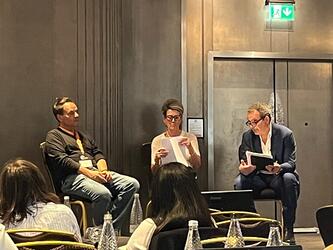Why data is another story

Just a few weeks ago, a £1.9bn private equity deal with Informa – another British company snapped up by the Americans – largely went under the radar.
The acquisition by Warburg Pincus of medical data provider Pharma Intelligence is yet more evidence that the ability to speed up the way market research and brand insights are delivered to decision-makers is more vital than ever. Warburg Pincus is renowned for the way it turns pure data into meaningful insights.
The deal comes just a few weeks after Salesforce bought a company called Narrative Science whose mission is “to help everyone understand and act on data through the power of data storytelling”. Its innovative technology automates the analysis of data into a narrative format that makes it easier for people to read, understand and share. By leveraging this technology across the entire company, Salesforce clearly hopes its stakeholders will consume and react to stories rather than pure data.
Excuse the rehashed metaphor, but if data is the new oil, then data storytelling is the drill, pipeline, refinery and tanker all rolled into one.
However, in a research environment where data is all-consuming – used to tweak business strategies, understand customers more completely, reach new audiences, strengthen brand loyalties, deepen cultural relevance and enable true personalisation – leaders aren’t reading and reacting to it fast enough.
Netflix is a company that gets this brilliantly. Not only does its sophisticated story-led analysis of customer data make the user experience more fulfilling, it also feeds back into the company’s creative strategy so that new content is commissioned and bought with astonishing rapidity. Effective leadership is enabled by data storytelling.
According to a recent IDC study, over 64 zettabytes of data were generated in 2020 and global data creation and replication is set to grow by 23% through to 2025. But if you don’t understand what all that data means – really means – then what’s the point of it all?
The media world is a fascinating example of what’s happening. To compete with the likes of Facebook and Google, global agencies have spent the past few years buying, investing in and launching big data research firms. Dentsu has Merkle, Publicis has Epsilon, IPG has Acxiom, Omnicom has Omni and, recently, WPP launched Choregraph, with around 700 data and tech experts creating material for the entire organisation.
But they’re often hamstrung by an inability to turn that data into insights that fuel decision-making. The research is extraordinarily detailed and illuminating, but it doesn’t always lead to action because it’s not being translated.
Data only really comes alive when turned into a story. Boardrooms only really feel confident about making a decision when the data doesn’t just show them something – it tells them something. It enriches and inspires rather than sits there in increasingly complex strategy reports and PowerPoint presentations.
And here’s where the fault-line lies: if brands and their marketing teams want to invest in big data management and technology platforms, they need to invest in the skillsets that enable that big data to have a proper impact. To turn that data into storified insights that make sense to people whose brains are more often hard-wired to connect with creativity rather than pure numbers.
Last year, a fascinating study by Accenture and data analytics firm Qlik showed that a big data skills gap was costing companies billions. Of those surveyed, 87% believed data was an asset for their firm and yet only a quarter felt able to do anything with that data; three quarters felt overwhelmed by the flood of data that they had to deal with; just 37% thought their decisions were better because of the data. In fact, almost as many said they’d try to solve a problem without the use of data because they found it difficult to analyse.
That’s not the fault of the data but of how data is presented and shared. It’s dense, complicated and, well, too big. The instinctive reaction is to say we need to make marketing leaders and their creative teams better data analysts, give them data literacy skills and build a data-first culture. However, perhaps the exact opposite is true – give researchers and data analysts the tools to be creative, to speak the language of the boardroom, to translate what they have into actionable marketing insights and build skillsets that create a story-first culture.
If we want data to move swiftly throughout a company so that collaboration is fostered and key individuals can make decisions at speed, we need to use our human storytelling instincts to make sense of that data. A journalistic approach, transposing the ethos of a newsroom into data operations so that ‘humanness’ influences the raw information, is one option.
A recent survey by data consultants at NewVantage Partners found that 92% of firms are investing extra in harvesting more data and yet only 12% are investing in artificial intelligence to make sense of that data. Which means most are relying on people to do the work of robots. The only problem is that most people find it hard to tell data stories. We need to invest in skilling them up.
Too often, brands are ‘letting the data speak for itself’ and no one is listening. Or if they are, they don’t understand what they’re hearing and are too embarrassed to admit it. Give them a story full of data insights, however, and they’re captivated.
There’s a gaping hole in our big data obsession. What do we do with it all? To which the answer is: tell better stories.
Grant Feller is the founder of StoryMakers, a data storytelling consultancy.

We hope you enjoyed this article.
Research Live is published by MRS.
The Market Research Society (MRS) exists to promote and protect the research sector, showcasing how research delivers impact for businesses and government.
Members of MRS enjoy many benefits including tailoured policy guidance, discounts on training and conferences, and access to member-only content.
For example, there's an archive of winning case studies from over a decade of MRS Awards.
Find out more about the benefits of joining MRS here.













0 Comments